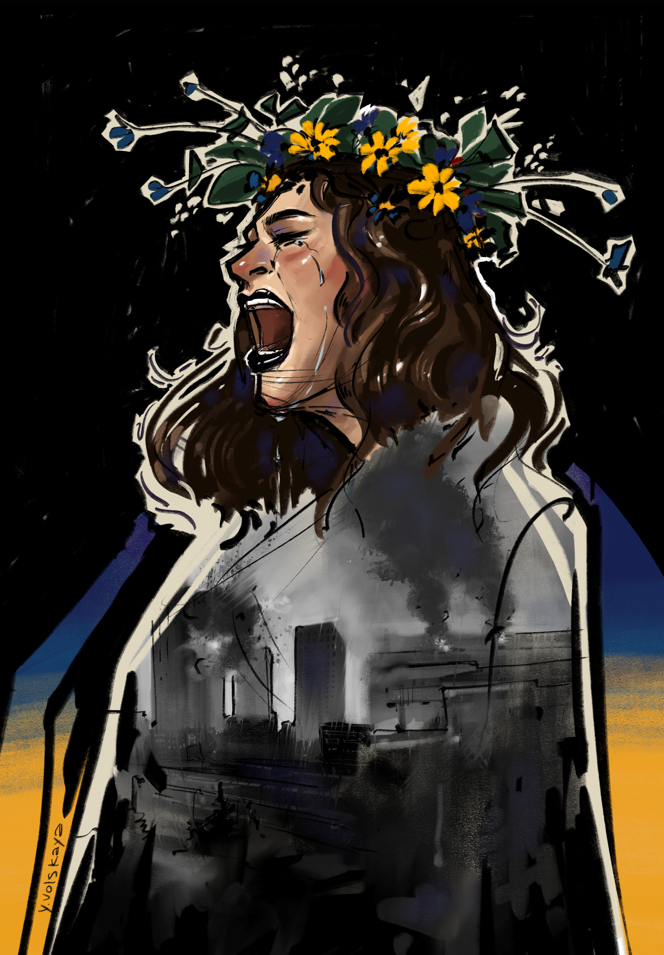


Now, as Ukraine is facing a full-scale war, yet another traumatic and nation-building event, one of the central topics of the Ukrainian Vibes 2022 project is that of difficult history. Sounds interesting, but not clear? So, let’s figure it out.
My personal interest in difficult history started about a year ago with realising that most historical traumas are still alive in societal consciousness, deeply influencing Ukrainian society nowadays. All modern states have periods of what we call difficult history, the heritage that still lives in our minds in the present and usually leads to fundamental disagreements over who we are and what values we hold. This past tends to be traumatic, a taboo for society and even hidden or forgotten by governments. Such traumatic experiences result not only from the physical devastation of a state but also from political manipulation of facts, which creates parallel public memories. Examples are Germany’s memorisation practices after World War II or post-soviet countries attempting to work on memories of Stalinist terror.
Another key concept is historical memory, explained in the following way in the Ukrainian book “Culture of historical memory”: “Modern science interprets historical and national memory as a phenomenon of historical and national consciousness and a key criterion of self-identification of the nation, as a major component of its cultural and spiritual sphere, as a way of inheriting, preserving and transmitting ideas, knowledge, values and figures of the past, considers it in various ways as a public (national), collective, corporate and individual experience of self-preservation and development.” Basically, historical memory is a societal remembrance of the past, that immensely contributes to the national identity of the society and the ideas circulating in public regarding the country people live in.
We all heard that it is important to know one’s history, but why it is imperative for a nation to recognise and take responsibility for its difficult past and ways of memorising it? Well, every wound must be healed, and every trauma must be worked with, and the same goes for historical traumas. An unprocessed past creates a tear in our social “fabric” with no subtle mechanisms created to heal it. There is even a term called “ruptured memories”, which represents the absence of continuity of memorisation in a society. It is used when old templates and rules of behaviour cease to work and the new ones have not yet been created. That is when the young generation doesn’t have the experience of previous generations to rely on.
The explanation by Oksana Dovgopolova is the one, that I personally can relate to very deeply: “… the peaceful experiences cease to exist. Memories become irrelevant. The world before the war seems unreal now, it takes an effort even to believe it ever existed.” This is what our grandparents and great-grandparents lived through during World War II, this is what every Ukrainian is experiencing right now, yet another historical trauma for the people of my country. We live and in my case always have been living in the world of ruptured and unhealed memories without even realising it.
Any traumatic experience tends to be silenced, living in the back of the mind of the majority of the population. Remaining unprocessed, it contributes to rupturing memories. Here two major problems are created. First of all, if the past is not processed, people can be extremely easy to manipulate as they sometimes live in some kind of alternative reality, where “War is peace. Freedom is slavery. Ignorance is strength.” Governments are free to create any national identity for such societies “from above”, and citizens don’t really participate in the process, hence they don’t control values that are key to the nation. Secondly, unhealed states are doomed to live in the past. Their ideas of identity are conserved; they do not see their nation outside the frames rigidly outlined by a traumatic experience, because it might be too painful and hard to recognise the truth hidden for so long.

Created by Yulia Volskaya (Instagram: @y.volskaya)
Every day we observe the results of these processes in national memory when reading about the feverish will to repeat triumphal wars, we read about the consequences of these unhealed traumas in the context of nations’ inferiority complexes, and we sense the pain from our difficult past in conscious or unconscious rituals of memorisation we practice or observe in our daily life. The way a nation deals with its difficult past is directly reflected in its identity, shaping new generations of citizens.
I truly believe that sustainability doesn’t end with environmental issues, education or human rights. A sustainable society is one that admits its past faults, knows its strong suits and takes responsibility for its present in every aspect of life, whether it’s the responsibility for sorting garbage or that for the actions of its elected political representatives. As my favourite authors who are brothers Strugatskie said “But most of all I am afraid of the dark because in the dark everyone becomes equally grey. … And where grey triumphs, black always comes to power.” And it is our duty to dispel the darkness, to make the healing process most productive for the sustainable future of our society now, when darkness has not taken over our world completely.
Written by Anna Proskurina.
Translated into Ukrainian by Anna Proskurina and into German by Katharina Bews.
Used Material:
- Reconstruction of memory – a curatorial project by Lia Dostlieva and Andrii Dostliev with the assistance of “IZOLYATSIA. Platform for Cultural Initiatives”
- Culture of historical memory, edited by Yurii Shapoval, Institute of Political and ethnic-national research, Kyiv, 2013
- An inconvenient past: the memory of state crimes in Russia and other countries, Nikolay Epplee, Новое литературное обозрение, Moscow, 2020

